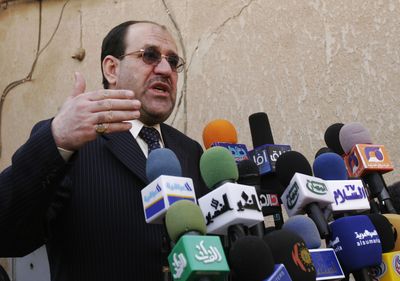Top Iraqi cleric won’t block deal
U.S., al-Maliki in talks over future of troops

BAGHDAD – Iraq’s prime minister said Friday that the country’s most influential Shiite cleric will leave the decision on the future of U.S. troops to the government and parliament – a step that could remove a major obstacle to a deal.
Prime Minister Nouri al-Maliki, a Shiite, journeyed Friday to the Shiite holy city of Najaf to brief Grand Ayatollah Ali al-Sistani about the progress in talks with the U.S. on a security agreement governing operations of American forces starting next year.
After a 2 1/2 -hour meeting, al-Maliki told reporters that the Iranian-born cleric would not oppose the security deal if it is approved by the country’s democratic institutions – including parliament, which must ratify the pact.
Al-Sistani’s office had no comment.
However, it would be politically untenable for al-Maliki to accept a deal and send it to parliament for ratification if al-Sistani spoke out publicly against it.
Al-Sistani’s earlier insistence that only elected officials draft Iraq’s first constitution after the 2003 fall of Saddam Hussein forced the United States to change its blueprint for the country’s transition to democratic rule.
Al-Sistani also pressured the Americans to agree to the first post-Saddam elections in January 2005.
American and Iraqi officials have said they are close to an agreement that would replace the U.N. mandate for U.S. forces in Iraq; the mandate expires Dec. 31. But the most contentious issue – legal jurisdiction and immunity for U.S. troops under Iraqi law – remains unresolved.